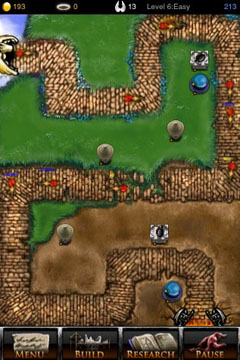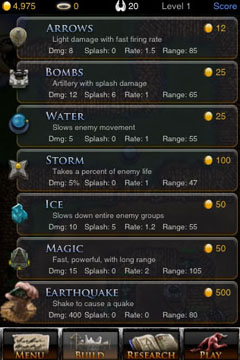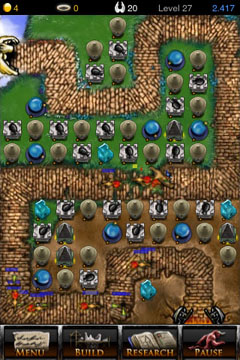TapDefense
Developer: TapJoyPrice (as reviewed): Free from the AppStore
Regardless of whether Fieldrunners is better, there’s no denying that TapDefense is one of the most balanced iPhone tower defence games, even if the linear path that monsters are forced to follow removes some of the more advanced player tactics. There’s no maze-making or clever juggling techniques crammed into TapDefense – just the careful considerations of which towers to place where, how to upgrade them and what to research next.
The presentation of the game is arguably a bit rough and it’s obvious to anyone with eyes that Fieldrunners is an altogether prettier experience, but TapDefense retains a crude charm even if is a little drab and monotonous after a while.
If you’re in need of a little something extra to spice the game up though then there’s always the various tasks in Challenge Mode to consider, which lay restrictions on what you can do. Fancy starting the game with everything unlocked, or with only a pittance of cash? How about tackling the hordes of hell with a maximum of ten towers?
Even with these additions though, TapDefense never manages to be as exciting or tense as something like Fieldrunners – the constant interruptions, mission briefings which warn you what to expect in the next wave and the banner ads between missions ensure that. TapDefense may be free and feature-full, but it’s also a tad stilted and samey.
Verdict: Not a bad tower defence game by any means and worth a look if you fancy some free fun, but there are better games out there for those willing to splash the cash.
BlackOut
Developer: GrunewaldDevPrice (as reviewed): Free from the AppStore

BlackOut is far from unique and, truth be told, there are dozens of titles with identical gameplay on the AppStore which are also available for free. This just happens to be the one which we’ve stumbled across though and is therefore the one we favour.
The aim of BlackOut is simple; all you have to do is just extinguish all the lights on the grid, which is a fairly easy task on the early levels. It gets more complex though as every time you poke a tile it will extinguish any other lit tiles around it and vice versa. The area of effect for each tile is a ‘+’, not a full square, which further complicates matters.
Disappointingly, that’s really all there is to BlackOut and progression is a linear affair that pushes you endlessly forwards onto the next puzzle. There are 150 puzzles to crack, though we’ve only made it up to puzzle 34 so far, and the game keeps track of how many moves you’ve made so you can compare to others via the website – but feature-wise that it.
It’s hard to fairly criticise BlackOut as it is free and to-the-point in what it does, but the fact remains that the game would benefit greatly from a few tweaks. A level selector for skipping past troublesome conundrums would be especially handy, as some levels are bound to leave you wracking your head and wringing your hands. A hint system or level creator would be valuable additions too, but now we’re moving away from ‘needs’ and towards ‘wants’.
Verdict: BlackOut is, like a exhibitionist grandmother, stripped down a lot more than it really needs to be. The puzzles are still good and the interface clean and responsive – but the lack of a level selector is a punishing oversight.
Check out the second instalment of our iPhone and iPod Touch Games Round-Up for more iPhone game reviews.

MSI MPG Velox 100R Chassis Review
October 14 2021 | 15:04













Want to comment? Please log in.